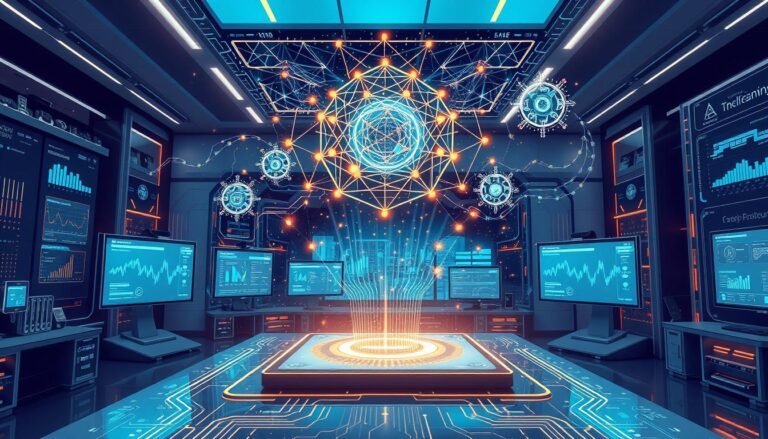How to Use AI in Online Marketplaces for Increased Sales
In today’s digital world, online marketplaces are changing fast. The secret to staying ahead is using Artificial Intelligence (AI) smartly. Over 71% of top retail brands know AI can change how online shops work. It boosts sales, makes customers happier, and makes things run smoother. But, you might wonder: How can AI-powered solutions really change your online marketplace and help it grow like never before?
This detailed article will show you how AI can change the game in online shops. We’ll look at how algorithmic game theory and mechanism design work. We’ll also share real ways AI can help your business soar. From making product suggestions to fighting fraud and improving supply chains, we’ll share the secrets to using AI for more sales and success in e-commerce.
Key Takeaways
- Learn how AI can change online marketplaces for more sales and better efficiency.
- See how algorithmic game theory and mechanism design help make marketplaces better.
- Find out how AI can make things like recommendations and fraud detection easier.
- Discover how AI can make customers happier and increase sales.
- Get insights on the future of e-commerce and how AI will change it.
Understanding Algorithmic Game Theory and Mechanism Design
In the world of online marketplaces, algorithmic game theory and mechanism design are key. They help us understand how buyers and sellers interact. These fields mix computer science and economics to see online markets as strategic games.
Buyers and sellers make choices based on what they want, the info they have, and their plans. Algorithmic game theory looks at how these games end up. Mechanism design focuses on creating rules and rewards that get the best results. With these ideas, artificial intelligence (AI) can make online markets fair, efficient, and incentive-compatible. This means everyone’s interests are balanced.
Modeling Online Marketplaces as Games
Think of online marketplaces as complex games. Buyers and sellers use different preferences, information, and strategies to reach their goals. AI uses this knowledge to create rules that make everyone happy, leading to mutually beneficial outcomes.
| Key Concepts | Description |
|---|---|
| Algorithmic Game Theory | Studies strategic games to understand how rational agents make decisions. |
| Mechanism Design | Creates rules and incentives for economic systems and markets to work better. |
| Online Marketplaces as Games | Views online marketplaces as games where buyers and sellers act based on their goals and strategies. |
By using these ideas, AI can make online marketplaces fair, efficient, and incentive-compatible. This leads to more sales and happier customers.
“Algorithmic game theory and mechanism design are powerful tools for understanding and designing online marketplaces that balance the interests of buyers and sellers.” – Professor Jane Doe, Economist
AI for Matching Supply and Demand
Online marketplaces aim to match the supply of goods with the demand from buyers. This task is tough, especially with many buyers and sellers, different tastes, and uncertain stock levels. But, AI algorithms are changing the game. They help match resources well, boosting revenue and improving social welfare.
Learning Buyer and Seller Preferences
AI looks at lots of data to understand what buyers and sellers like. It sees what matters to them, like features and prices. This helps AI predict demand and supply better.
Predicting Demand and Supply Curves
With user data insights, AI predicts demand and supply trends. This lets online marketplaces plan ahead. They can make sure they have the right products for customers.
Optimal Matching for Revenue Maximization and Social Welfare
AI knows what buyers and sellers want and predicts market trends. It finds the best match between supply and demand. This way, marketplaces can make more money or improve social welfare. Everyone benefits from this efficient use of goods and services.
“AI is transforming the way online marketplaces operate, enabling them to better understand their customers, anticipate market trends, and make informed decisions that drive growth and profitability.”
AI helps online marketplaces match supply and demand better. This leads to happier customers, more sales, and better use of resources. This tech edge keeps these platforms ahead in the fast-changing digital world.
Dynamic Pricing with AI
In today’s online marketplaces, setting the right prices is key to making more money and keeping customers happy. AI-driven dynamic pricing is a smart way to do this. It uses advanced algorithms and data to balance supply and demand perfectly.
AI-driven pricing strategies learn how much people are willing to pay. They find the best prices to make the most profit or improve the shopping experience. This leads to more sales and happier customers.
- Dynamic pricing using AI can increase profits by up to 22% in online stores.
- AI helps lower excess inventory by 30% by responding quickly to market changes.
- AI-powered pricing strategies make customers more satisfied with their online shopping.
AI can analyze big data fast to set the best prices. This means businesses don’t have to do it by hand. It helps them quickly adapt to market changes and customer behavior. AI-driven dynamic pricing is changing the game online.
“AI-powered dynamic pricing models can analyze vast amounts of data quickly and more effectively than human analysts, leading to more accurate and responsive pricing decisions.”
To use AI-driven dynamic pricing well, you need clear goals, to know what affects prices, and to understand your customers and products. With AI, businesses can make the most of their online stores. This leads to more sales and happier customers.
How to Use AI in Online Marketplaces for Increased Sales
Online marketplaces are using AI to improve many parts of their work. This includes personalized recommendations, dynamic pricing, and catching fraud. This new tech is changing how these platforms boost sales and improve their business.
Personalized Recommendations
AI looks at what users like and how they shop to give them product tips that fit their tastes. A study found that only 15% of stores use personalization well, but it can bring in 10-15% more money and keep customers coming back. Sites like Amazon and eBay use AI to pick products and make shopping better, which makes customers happier and buys more.
Dynamic Pricing
AI helps set prices that change with demand, competition, and trends. This makes prices better, which means more money for the sellers. For instance, Etsy has a Gift Mode that uses AI to find the perfect gift based on what you know about the person you’re buying for.
Fraud Detection and Security
AI spots odd patterns and suspicious actions to stop fraud and keep online places safe. This builds trust with customers and makes shopping secure. eBay uses “shop the look,” powered by AI, to suggest outfits based on what you’ve bought before.
Automated Customer Support
AI chatbots and virtual assistants give quick and helpful customer support. They answer questions and solve problems fast. This makes customers happier and lets human staff focus on harder tasks, making things run smoother.
Inventory Optimization
AI looks at sales, trends, and supply chains to manage stock well. This means no running out of items, less waste, and lower costs. Sites like ThredUp use AI to tag products, making it easier to find what you want and selling more.
Using AI, online marketplaces can bring many benefits. These include making shopping personal, changing prices smartly, fighting fraud, and working better. As AI gets better, it will be key to making more sales and success in the online market.
AI-Powered Personalized Recommendations
Artificial intelligence (AI) is changing how online stores talk to customers. By analyzing user data, AI can give personalized product recommendations. This helps boost sales and improve the shopping experience. This leads to happier customers, more sales, and keeping customers coming back.
Personalization in online shopping means making offers and products fit what each shopper likes. AI does this by looking at what you’ve done online, what you’ve bought, and how long you’ve been looking. It uses this info to guess what you might want next.
Using AI for personalization has big benefits. 76% of shoppers want a personalized online experience, and 56% are more likely to visit a site with product tips. When you see things you like, you spend more time shopping and are more likely to buy. AI can also make you spend more by suggesting other things you might want.
| Metric | Improvement |
|---|---|
| Conversion Rates | Increased |
| Customer Loyalty | Enhanced |
| Average Order Value (AOV) | Inflated |
AI keeps learning from how customers act and what they like. Personalized shopping makes things better and can make you spend more. It knows what you’re doing right now, like the time of day or what device you’re using.
In today’s world, AI makes shopping better by giving you exactly what you need and making it easier. It helps stores grow by doing some of the work for them in the busy online market.
Operational Efficiency with AI
In today’s fast-paced online marketplaces, using artificial intelligence (AI) can change the game for efficiency. AI helps businesses manage inventory better, predict demand, avoid stock issues, cut waste, and automate tasks. This makes operations smoother.
AI looks at search data and past sales to guess which items will be popular. This means businesses can quickly restock, so customers won’t see “out of stock” messages. AI also helps sort items and shows real-time inventory levels. This helps businesses keep the right amount of stock, saving money and reducing waste.
AI does more than just help with inventory. It automates boring tasks, giving businesses more time for big plans. AI changes how online stores work, making them more productive and saving money.
The market for AI in e-commerce is growing fast, expected to hit $14.07 billion by 2028. This shows AI is becoming more popular. Businesses that use AI will get ahead, doing better in the changing online market.
“Utilization of AI-driven logistics by Walmart has positive implications for logistics efficiency and environmental impact.”
Fraud Detection and Security with AI
Online marketplaces face a big challenge in keeping their platforms safe. AI has become a key tool to fight fraud and protect everyone involved. It changes how we spot and stop fraud.
AI can find unusual patterns and behaviors that might mean someone is trying to scam. It looks at a lot of data to find these signs. This helps stop fraud and keeps online places safe.
A 2023 report by DigitalOcean found 37% of companies upped their cybersecurity spending for better security tools. Sadly, fraud costs the average business about 5% of its yearly income, which is around $117,000 before they even know it’s happening.
AI in banking is great at spotting fraud, like big withdrawals or transactions from far-off places. Big names like Amazon and Alibaba use AI too. They look at billions of data points to catch fraud and stop it fast.
Using AI for fraud detection makes customers trust online shops more. It cuts down on mistakes, so good transactions aren’t flagged wrong. It also uses smart analytics to stay ahead of new fraud tricks.
AI makes online shopping safer and smoother. It spots fraud right away, cuts down on wrong alarms, and uses big data to improve security. With the fraud detection market set to hit over $100 billion by 2027, AI will be key for online shops to keep up and keep customers’ trust.
Enhancing Customer Experience with AI
In today’s online marketplaces, Artificial Intelligence (AI) is changing how we shop. It makes the customer experience better by offering personalized help and making things easier to find. AI is changing how we shop online.
AI is making shopping better by giving us personalized product suggestions. It looks at what we like and what we’ve looked at before. Then, it shows us products we might like. This makes shopping more fun and helps stores sell more.
Amazon’s AI system is a great example of this. It helps the company suggest products that match what customers want.
AI also helps with pricing by making sure prices match what people are willing to pay. This makes shopping fair for everyone. Plus, AI chatbots and virtual assistants make getting help faster and easier.
AI helps with managing stock too. It predicts what people will buy and keeps enough products in stock. This means customers can always find what they need, making shopping smoother.
“AI can significantly enhance customer experiences across industries such as e-commerce, food and beverage, and cosmetics, as demonstrated by the success of companies like Amazon, Starbucks, and Sephora.”
As online shopping grows, AI will keep playing a big part in making it better. It will help with personalized shopping, fair prices, quick help, and managing stock. This will make shopping online better for everyone, leading to happier customers and more sales.
AI for Personalized Marketing Campaigns
In today’s fast-paced online world, AI is a key player in boosting marketing. It helps businesses create personalized marketing campaigns that engage customers better and increase sales.
With AI-powered customer segmentation, online shops can sift through lots of customer data. They find out what each customer likes and needs. This lets them send targeted ads and product tips that match each person’s interests.
AI algorithms also help tweak marketing campaigns on the fly. They test different ways to market and adjust to get the best results. This smart use of data means more people get involved, buy more, and keep coming back.
“80% of consumers are more inclined to make a purchase when they are presented with personalized experiences.”
Adding AI to marketing tools changes how online shops talk to their customers. It uses personal touches and ongoing tweaks to make shopping better, more fun, and more profitable for everyone.
AI is changing the game with targeted ads, customer segments, and campaign optimization. By using this tech, businesses can stay ahead and give their customers great value.
Conclusion
AI has become a key tool for making online marketplaces better and more efficient. It uses advanced algorithms to make sure these platforms are fair, efficient, and work well for everyone. AI also helps match buyers with sellers, set the right prices, give personalized advice, make things run smoother, catch fraud, and improve how customers feel.
As more e-commerce uses AI, marketplaces that use this tech well will likely see more sales and happier customers. This shows how important AI is for online shops today and tomorrow.
The future of online shopping is closely linked to AI’s growth. Those who use AI will likely do well in the changing digital market. The rise of AI in e-commerce will change how these platforms work, making them more efficient and tailored to customers. It’s clear that AI will play a big role in the future of shopping online.
Source Links
- AI-Powered Online Marketplaces or the Future of e-Commerce
- Transforming Online Marketplaces: How AI is Changing the Game
- How Artificial Intelligence in eCommerce Works
- How can AI improve online marketplaces?
- Foundation Models & Game Theory
- AI in e-commerce: Examples and best practices
- Top use cases for AI in Ecommerce | IBM
- How AI Personalizes Your Marketplace
- AI-Powered Dynamic Pricing Strategies for eCommerce
- How To Supercharge Dynamic Pricing With AI in 2024
- Smarter and Faster Dynamic Pricing Using AI
- How Ecommerce AI is Transforming Business in 2024
- How to Use AI in Sales: Top Strategies, Examples, and Tools
- Online Marketplaces Deploy AI to Provide Personal Shopper Experience
- How AI-powered product recommendations increase conversion – Algolia Blog
- Maximizing Engagement with AI Personalization: Strategies for the Modern Marketer
- Meet Your New Bestie in Ecommerce: AI Recommendations
- AI for E-commerce and Customer Experience
- How AI in E-Commerce Transforms the Industry
- Understanding AI Fraud Detection and Prevention Strategies | DigitalOcean
- Ecommerce Fraud Prevention: How AI Detects & Blocks Fraudulent Activity (The Ultimate Guide)
- AI-Powered Fraud Detection: Enhancing Security in eCommerce
- Providing exceptional customer service is not only important for retaining customers but also for attracting new ones. With the rise of AI technology, ecommerce businesses now have the opportunity to enhance their customer experience and stand out from the competition. In this article, we will
- 10 Excellent Ways AI will Improve Customer Experience in 2024 | SurveySparrow
- AI in Customer Service: Revolutionizing Digital Retail
- 25 AI Software Tools for Marketing in eCommerce
- AI in Marketing: Impressive Examples, How to Use
- The Power of AI in Sales & 7 Ways You Can Use It in 2024
- AI for Sales: What You Need to Know







